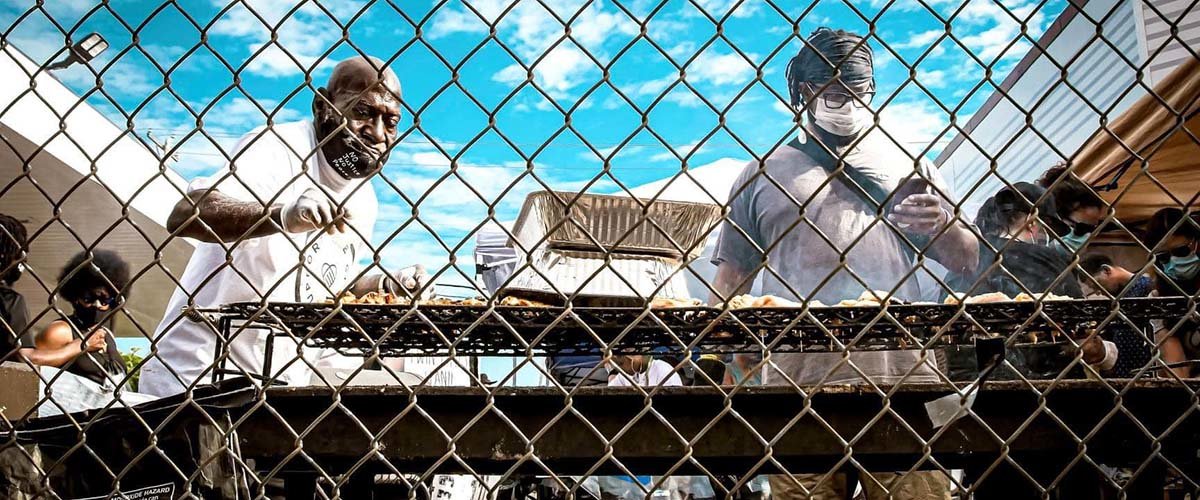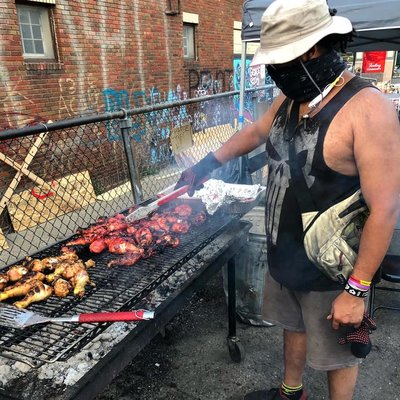
Science student, social justice steward

Julian Green, Journalism, BA '21
Plant science senior and Twin Cities Relief Initiative cofounder Bryant Jones talks about “the coolest college on the UMN Twin Cities campus” and his leadership work to strengthen community
Bryant Jones believes in the power of community — and the power of plants. This enterprising plant science senior in the College of Food, Agricultural and Natural Resource Sciences (CFANS) has done volumes of impressive work in horticultural science — and has supported and uplifted his community through personal social justice initiatives — all as an undergraduate.
To Jones, food is community. Food is self-determination. “It's very practical and pragmatic,” he said. “And I feel the skills taught in CFANS should be mandatory to all humans. Having an in-depth knowledge of plant life cycles and how they impact your life is a skill that should never be overlooked.”
Plant science has given Jones the infrastructure he needs to complete research approved by the University of Minnesota Board of Regents on the medical and cosmetic use of Cannabis sativa. “Through CFANS, I have been able to explore the things that excite me in horticulture and in many cases have taken me outside the classroom. Questions that I had before becoming a student I have turned into research projects,” he said. His first research project on cannabinoids and terpenes, the class of compounds that contribute to the taste and smell of cannabis, was used to help maximize the potential for both of these factors to develop a novel chemovar (a chemical variation used to identify cannabis by chemical makeup rather than by species) of cannabis. His second research project focused on testing new methods of plant management to drive down costs for the Minnesota Medical Cannabis Program. He encourages students to be as engaged as possible within their major and college. He also said, “Share your knowledge with the instructors. They learn from us as well.”
Through this research, Jones also helped design the first cannabis Sativa-focused course titled AGRO 2402: The Science of Cannabis. He believes in the future of the cannabis industry and hopes that this and subsequent courses will help students get their foot in the door. “The cannabis industry will not be disappearing anytime soon,” he said. “This class is the first step down this road by offering a turnstile of industry-leading professionals to articulate exactly what is going on in their specific sector of the cannabis industry.” Jones hopes that CFANS develops a second course that will incorporate lab work and allow students to work directly with the cannabis species.
Commitment to community
Beyond the classroom, Jones’ work extends into the Minneapolis community. In the aftermath of George Floyd’s murder, he co-founded the Twin Cities Relief Initiative alongside others who saw an opportunity to help. “We were a group of friends who noticed the need to keep people's bellies full and provide hydration to people protesting,” he explained. Through the support of material donations, Jones and his friends were able to provide their neighbors with much-needed items like diapers, baby formula, toiletries, and other essential items. After spending time doing these supply runs, he identified another item missing from the neighborhood. “I noticed the absolute lack of fresh produce that was available to residents in the community where George Floyd was murdered,” he said.
Jones got to work to provide the community with fresh, high-quality food. “Our goal is continuing to provide high-quality food and essential products to people that need to focus on everything else in life,” said Jones. “Providing these pop-up oases of stress relief around the Twin Cities allows those in need to get items that make a real-time difference. Nothing about our services is second rate, because instilling that worth in people is our ethos; everyone is worth a five-star meal.” He also hopes to eventually build a food jungle, an area where fresh and nutritious food is plentiful, on 38th and Chicago Avenues in collaboration with the owner of Cup Foods and Horticultural Science Professor Tom Michaels.
Research for social justice results
Jones sees a clear connection between his work in cannabis research and his activism. “The very essence of cannabis research has an aspect of social justice embedded in it,” he said. “Cannabis gave birth to the mainstream counter-culture, creating a group of people in need of advocacy, which has created the framework for legalization in our country today. Research is the bridge between legalization and incarceration; a paradigm that is shared with addressing systemic racism and how this affects Black, Indigenous and People of Color (BIPOC) and our communities.”
In the future, Jones plans to be president of cultivation and develop horticultural cannabis intellectual property for medical, recreational and veterinary applications while working on his PhD. He also plans to partner with Agronomy and Plant Genetics Assistant Teaching Professor Mary Brakke to develop another cannabis-centered course, this time including a lab aspect. More than anything, Jones wants to make an impact for BIPOC within CFANS and ensure that the college continues to work toward building an environment that is unequivocally safe and supportive of all races.
Hero Image Photo credit: FM Visions. All other photos courtesy of Bryant JOnes.







